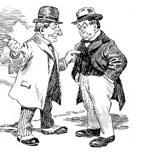
What Is Integralism?
MOVING BEYOND LIBERALISM
A specter is haunting the Catholic world — the specter of integralism. The most opposed groups — both Catholic conservatives and Catholic liberals, as well as some less informed Catholic traditionalists — unite in opposition to and even fear of it. But what, exactly, is integralism, and what can be said on its behalf?
Integralism is essentially nothing but adherence to all the teachings of the Catholic Church on faith and morals, something which, as Catholics, we are always obliged to do. Specifically, integralism is distinguished by three chief points: (1) adherence to the Church’s teaching on the social order and, in particular, to the restatement of that teaching by Pope Leo XIII in the late 19th century; (2) recognition that religion is not merely a private matter, and so discourse about God, good and evil, and the ultimate purpose of human life needs to take place at the level of society itself; and (3) as a result of the first two points, opposition to liberalism in all its forms. Each of these points needs considerable explanation.
The moral teaching of the Catholic Church is not limited to personal morality, still less to matters of sexual morality. Her teaching deals with the entire range of human life, both personal and social. Hence, it includes political and economic matters. It is no secret, however, that many Catholics are not comfortable with this. Even if they accept the Church’s authority on matters of individual morality, many are apt to think that the Church really has nothing to say on political matters, especially economics. Such an attitude is not new, but it has gotten much worse since the Second Vatican Council. But to deny the Church’s authority in such matters is a distortion of Catholic teaching, for the Church speaks authoritatively on political and social matters: the economy, war and peace, and so on. Too often, Catholics have come to regard such subjects as foreign to the Church’s magisterium and simply accept whatever the culture around them offers. This is true of both conservative and liberal Catholics, and it has been the case too often for well over a hundred years of Catholic life in this nation, as the Americanist controversy of the 1890s showed so clearly.
Leo XIII, who ascended to the papal throne in 1878, faced a deteriorating situation throughout the Catholic world. The temporal power of the popes over central Italy had been lost in 1870; unbelief was on the rise everywhere; the Catholic masses were losing their religious fervor in large numbers; and the international community increasingly saw the papacy as irrelevant. An important part of Leo’s response to this was to restate the chief points of Catholic doctrine for his contemporaries and, in particular, to restate the Church’s doctrine on the social order, which he did in a series of remarkable encyclicals over the course of his long reign.
You May Also Enjoy
A poor woman once told me that the Church “belongs” to her kind of people, not to them, the rich, the quite comfortable — appearances notwithstanding.
Review of The Search for Historical Meaning... The Capitalist Revolution... Conservatism... Alexis de Tocqueville... and Irving Babbitt in Our Time.
Socrates asks what would happen to a capitalist nation if everyone practiced the greedlessness of Jesus, or Buddha, or even Thoreau?

